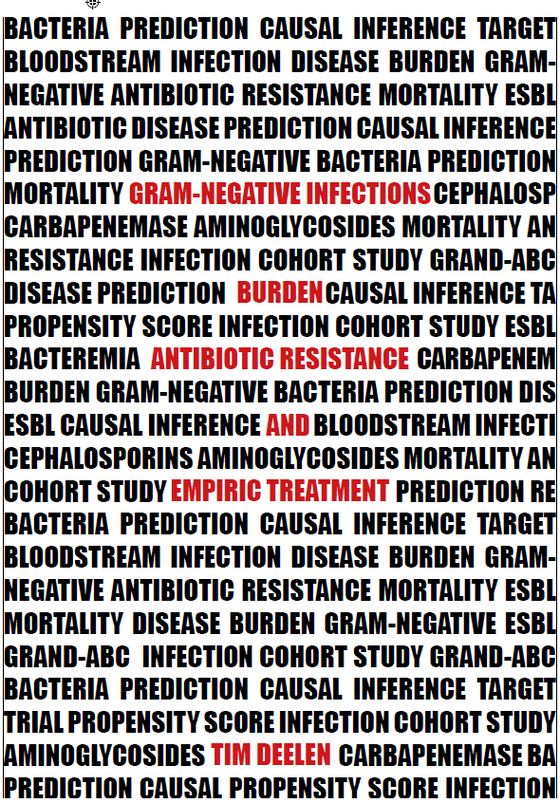Dec 11: Infections with Gram-negative bacteria responsible for significant mortality

Infections with Gram-negative bacteria form a significant burden of mortality in hospitalized patients in country with low antimicrobial resistance such as the Netherlands, contributing to more than 2,000 deaths per year. Of these, approximately one-third occur after non-bacteremic GNI and two-third after bacteremic GNI. These findings were presented by Tim Deelen in his PhD thesis that he defended at Utrecht University on December 11, 2020.
There is a global increase in infections caused by Gram-negative bacteria. The majority of research is on bacteremic (presence of bacteria in the blood, also called ‘bloodstream infections’) Gram-negative infections (GNI), leaving a knowledge gap on the burden of non-bacteremic GNI. Tim Deelen (Julius Center for Health Sciences and Primary Care, UMC Utrecht) described in his PhD research project the characteristics and determined the burden of bacteremic and non-bacteremic GNI in hospitalized patients in the Netherlands.
Bacteremic and non-bacteremic mortality
Tim Deelen and colleagues conducted a prospective cohort study of patients in 8 Dutch hospitals with microbiologically confirmed GNI, between June 2013 and November 2015. In total, 1,954 patients with GNI were included in the analysis of which 758 (39 percent) were bacteremic. 243 GNI (12 percent) involved multi-drug resistant pathogens. The 30-day mortality rate was 11.1 percent (217 deaths) Estimated national incidences of non-bacteremic GNI and bacteremic GNI in hospitalized adults were 74 and 86 per 100,000 person years, respectively. Extrapolating to the total Dutch population this yielded estimated annual figures of 30-day all-cause mortality of 1,528 (range: 1,102-1,954) for bacteremic and 982 (range: 688-1,276) for non-bacteremic GNI.
Large burden of disease
GNI form a large burden of disease in hospitalized patients in country with low antimicrobial resistance (AMR) such as the Netherlands, with more than 2,500 deaths per year (a mortality figure that is in the same range as diabetes mellitus, prostate cancer or breast cancer). Tim Deelen concludes: “With such a high incidence, prevention of GNI should receive more attention. As a considerable part of disease burden originates from community-acquired infections, targeting non-hospitalized patients is important. We therefore look forward to innovative vaccines against Gram-negative bacteria which are currently in clinical development.”
Further findings
Other findings and conclusions from Tim Deelen’s PhD work are:
- There appears no attributable mortality of AMR in Gram-negative bacteria in the Netherlands, no impact of inappropriate (empiric) therapy, and therefore the AMR burden in Gram-negative bacteria is negligible.
- Empiric therapy can be optimized in patients with suspected bacteremia by implementing the ESBL-PREDICT rule on emergency wards, although there are some important caveats for implementation.
- There does not seem to be a beneficial effect of short-course adjunctive aminoglycosides on 30-day mortality of patients with Gram-negative bacteremia.
- A clinical trial on the benefits and harms of short-course empiric aminoglycosides is needed to end this debate.
- Causal research on the AMR burden is biased and selection of methods has a large impact on reported effect estimates.
PhD defense
Tim Deelen (1991, Purmerend) defended his PhD thesis on December 11, 2020 at Utrecht University. The title of his thesis was “Gram-negative infections – Burden, Antibiotic Resistance and Empiric Treatment”. Supervisors were prof. dr. Marc Bonten and prof. dr. Jan Kluytmans. Co-supervisor was dr. Henri van Werkhoven (all Julius Center for Health Sciences and Primary Care, UMC Utrecht). The results of the part of his PhD project discussed here have recently been published in Journal of Infection. Tim Deelen works as a junior associate at McKinsey & Company in Amsterdam.

